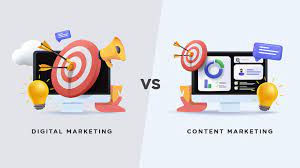Content Marketing in Digital Marketing: Driving Success Through Compelling Storytelling
In the rapidly evolving landscape of digital marketing, content has emerged as a powerful tool for businesses to engage their target audience, build brand awareness, and drive conversions. Content marketing, a strategic approach to creating and distributing valuable and relevant content, has become a cornerstone of successful digital marketing campaigns.
At its core, content marketing is all about storytelling. It goes beyond traditional advertising by focusing on providing value to the audience rather than simply promoting products or services. By creating compelling narratives that resonate with their target market, businesses can establish themselves as thought leaders and trusted sources of information.
One of the key advantages of content marketing is its ability to attract and retain an audience. By producing high-quality content that addresses the pain points and interests of their target market, businesses can capture attention and build trust. Whether it’s blog posts, videos, infographics, or social media updates, the goal is to deliver valuable insights and information that keep the audience coming back for more.
Moreover, content marketing plays a crucial role in search engine optimization (SEO). Search engines prioritize websites that offer relevant and authoritative content. By consistently publishing quality content that incorporates relevant keywords and provides value to readers, businesses can improve their search engine rankings and increase organic traffic to their websites.
Another significant benefit of content marketing is its potential for virality. Engaging and shareable content has the ability to spread rapidly across social media platforms, reaching a wider audience than traditional advertising methods alone. This amplification effect can significantly increase brand exposure and generate leads.
Furthermore, content marketing allows businesses to nurture relationships with their customers throughout the buyer’s journey. By providing educational resources and tailored content at each stage – from awareness to consideration to conversion – businesses can guide prospects towards making informed purchasing decisions. This personalized approach helps build trust and loyalty among customers.
To successfully implement a content marketing strategy in digital marketing efforts, businesses must first define their target audience and understand their needs, preferences, and pain points. This knowledge serves as a foundation for creating relevant and engaging content that resonates with the intended audience.
Additionally, businesses should focus on consistency. Regularly publishing fresh content helps maintain audience interest and keeps the brand top-of-mind. Consistency also helps establish credibility and authority in the industry.
Measuring the effectiveness of content marketing efforts is crucial to optimizing strategies and achieving desired outcomes. Key performance indicators (KPIs) such as website traffic, engagement metrics (likes, shares, comments), conversion rates, and lead generation can provide valuable insights into the success of content marketing campaigns.
In conclusion, content marketing has become an integral part of digital marketing strategies. By leveraging the power of storytelling to provide value to their audience, businesses can effectively engage, educate, and convert prospects into loyal customers. With its ability to drive organic traffic, enhance brand visibility, and nurture customer relationships, content marketing is a vital component for businesses seeking success in today’s digital landscape.
7 Frequently Asked Questions About Content Marketing in Digital Marketing: A Comprehensive Guide for UK Businesses
- What is content marketing?
- How can I use content marketing to increase my business’s visibility?
- How do I measure the success of my content marketing efforts?
- What are the best strategies for creating effective content?
- How often should I post new content?
- What types of content work best in digital marketing?
- What are the benefits of using a professional agency for content marketing services?
What is content marketing?
Content marketing is a strategic marketing approach that focuses on creating and distributing valuable, relevant, and consistent content to attract and engage a target audience. It involves the creation and sharing of various forms of content, such as blog posts, articles, videos, infographics, social media updates, podcasts, and more.
The primary goal of content marketing is to provide value to the audience rather than directly promoting products or services. By offering useful information, insights, entertainment, or educational resources related to their industry or niche, businesses aim to build trust and establish themselves as thought leaders in their field.
Content marketing involves understanding the needs and interests of the target audience and tailoring the content accordingly. It aims to address their pain points, answer their questions, solve their problems, or entertain them. By consistently delivering valuable content that resonates with the audience’s interests and preferences, businesses can attract attention, engage users, and build a loyal following.
One of the key benefits of content marketing is its ability to drive organic traffic through search engine optimization (SEO). By producing high-quality content that incorporates relevant keywords and follows SEO best practices, businesses can improve their search engine rankings and increase visibility in search results.
Content marketing also plays a crucial role in building brand awareness. Engaging and shareable content has the potential to go viral on social media platforms. When people find value in the content they consume, they are more likely to share it with others in their network. This amplification effect helps expand brand reach and exposure.
Additionally, content marketing supports lead generation efforts by attracting potential customers who are actively seeking information or solutions related to a particular topic. By capturing leads through gated content (content accessible after providing contact information), businesses can nurture these prospects into customers over time through targeted email campaigns or other forms of communication.
Overall, content marketing allows businesses to connect with their target audience on a deeper level by providing value beyond traditional advertising methods. It helps build brand authority, trust, and loyalty while driving organic traffic, increasing brand visibility, and generating leads.
How can I use content marketing to increase my business’s visibility?
Using content marketing to increase your business’s visibility can be highly effective in today’s digital landscape. Here are some strategies to consider:
- Define your target audience: Understand who your ideal customers are, their interests, pain points, and preferences. This knowledge will help you create content that resonates with them.
- Develop a content strategy: Create a comprehensive plan that outlines your goals, target audience, content formats (blogs, videos, infographics), and distribution channels (website, social media platforms).
- Create valuable and engaging content: Produce high-quality content that provides value to your audience. Address their challenges, answer their questions, and offer actionable insights. Ensure your content is well-researched, informative, and visually appealing.
- Optimize for search engines: Incorporate relevant keywords into your content to improve search engine rankings and increase organic traffic. Focus on creating informative and comprehensive pieces that address specific topics related to your industry.
- Leverage social media platforms: Share your content across relevant social media channels to reach a wider audience. Engage with your followers by responding to comments and encouraging discussions around your content.
- Guest blogging and collaborations: Contribute guest posts to reputable websites or collaborate with influencers in your industry. This allows you to tap into their existing audience base and gain exposure for your brand.
- Utilize email marketing: Build an email list of interested subscribers who want to receive updates from you. Send regular newsletters or personalized emails featuring valuable content tailored to their interests.
- Repurpose and distribute across multiple channels: Repurpose existing content into different formats (e.g., turning a blog post into a video or infographic) to reach audiences on various platforms like YouTube or Pinterest.
- Encourage user-generated content: Engage with your audience by encouraging them to create their own content related to your brand or products/services. User-generated content can increase visibility through word-of-mouth promotion.
- Analyze and optimize: Regularly measure the performance of your content marketing efforts using analytics tools. Analyze metrics like website traffic, engagement rates, conversion rates, and social media interactions to identify what works best and refine your strategy accordingly.
Remember, consistency is key. Regularly publish fresh and valuable content to keep your audience engaged and build brand visibility over time. By implementing these strategies, you can effectively increase your business’s visibility through content marketing.
How do I measure the success of my content marketing efforts?
Measuring the success of your content marketing efforts is essential for understanding the effectiveness of your strategies and making data-driven decisions to optimize your campaigns. Here are some key metrics and methods to consider:
- Website Traffic: Monitor the overall traffic to your website, including the number of unique visitors, page views, and session duration. An increase in traffic indicates that your content is attracting and engaging users.
- Engagement Metrics: Assess how users interact with your content by tracking metrics like likes, shares, comments, and social media engagement rates. Higher engagement suggests that your content resonates with your audience and encourages them to take action.
- Conversion Rates: Measure the percentage of website visitors who complete desired actions, such as filling out a form, subscribing to a newsletter, or making a purchase. This metric helps evaluate how effectively your content drives conversions.
- Lead Generation: Keep track of the number and quality of leads generated through gated content or lead magnets. Analyze how many leads convert into customers over time to assess the value of your content in driving conversions.
- Search Engine Rankings: Monitor changes in search engine rankings for targeted keywords related to your content. Improvements in rankings indicate that search engines recognize your content as valuable and relevant.
- Backlinks and Referral Traffic: Analyze the number and quality of backlinks you receive from other websites as they indicate recognition and authority within your industry. Also, monitor referral traffic from external sources to gauge the impact of partnerships or guest blogging efforts.
- Time on Page/Bounce Rate: Evaluate how long visitors spend on each page (time on page) and the percentage of visitors who leave immediately (bounce rate). A high bounce rate may suggest that your content does not meet user expectations or lacks relevance.
- Social Media Metrics: Track social media analytics such as follower growth, reach, impressions, clicks, and engagement rates across various platforms where you share your content. This data helps assess the effectiveness of your social media content strategy.
- Customer Feedback: Collect feedback from your audience through surveys, comments, or direct messages to gain insights into their perception of your content. This qualitative feedback can provide valuable information on how well your content meets their needs and expectations.
- Return on Investment (ROI): Assess the financial impact of your content marketing efforts by comparing the costs associated with creating and promoting content to the revenue generated as a result. Calculate ROI using revenue attribution models or by tracking specific campaigns and their impact on sales.
Remember, each business may have unique goals and metrics that align with their objectives. It’s crucial to identify the most relevant metrics for your specific business and regularly analyze them to gauge the success of your content marketing efforts accurately.
What are the best strategies for creating effective content?
Creating effective content requires a thoughtful and strategic approach. Here are some key strategies to consider:
- Define Your Target Audience: Understanding your audience is crucial for creating content that resonates with them. Conduct thorough research to identify their demographics, interests, pain points, and preferences. This knowledge will help you tailor your content to meet their specific needs.
- Set Clear Goals: Determine what you want to achieve with your content marketing efforts. Whether it’s brand awareness, lead generation, customer retention, or thought leadership, having clear goals will guide your content creation process and ensure that it aligns with your overall business objectives.
- Develop a Content Strategy: A well-defined content strategy outlines the types of content you will create, the platforms you will use, and the frequency of publishing. It should also include a content calendar to help you stay organized and consistent in delivering valuable content to your audience.
- Tell Compelling Stories: Storytelling is a powerful tool for capturing attention and engaging your audience emotionally. Craft narratives that resonate with your target market by addressing their challenges, providing solutions, or sharing inspiring success stories. Use storytelling techniques such as relatable characters, conflict-resolution arcs, and compelling visuals to make your content memorable.
- Provide Value: Focus on creating content that educates, entertains, or solves problems for your audience. Offer valuable insights, practical tips, industry trends analysis, or exclusive access to information that they can’t find elsewhere. By consistently delivering value through your content, you build trust and establish yourself as an authority in your industry.
- Optimize for Search Engines: Incorporate relevant keywords strategically into your content to improve its visibility in search engine results pages (SERPs). Conduct keyword research to identify high-impact keywords related to your industry or niche and optimize titles, headings, meta descriptions, and image alt tags accordingly.
- Embrace Visuals: Visual elements such as images, videos, infographics, and charts can enhance the impact and shareability of your content. Use visually appealing and relevant visuals to support your message and make your content more engaging.
- Encourage Interaction: Foster engagement with your audience by encouraging comments, shares, and discussions around your content. Respond promptly to comments and questions to show that you value their input. This interaction not only builds relationships but also helps extend the reach of your content through social sharing.
- Analyze and Iterate: Regularly monitor the performance of your content using analytics tools. Pay attention to metrics such as page views, time on page, social shares, conversions, and bounce rates. Analyze the data to identify patterns, trends, and areas for improvement. Use these insights to refine your content strategy and optimize future content creation efforts.
By implementing these strategies consistently, you can create effective content that resonates with your target audience, drives engagement, and delivers tangible results for your business.
How often should I post new content?
The frequency at which you should post new content depends on various factors, including your industry, target audience, resources, and goals. However, consistency is key in content marketing. It’s important to find a balance between providing fresh content regularly and ensuring the quality of each piece.
For blogs or articles, a general guideline is to aim for at least one new post per week. This frequency allows you to maintain a steady flow of content and keep readers engaged without overwhelming yourself or your team. However, if you have the resources and capacity to produce more high-quality content without sacrificing quality, you can consider increasing the frequency.
For social media platforms like Facebook, Twitter, or Instagram, the recommended posting frequency varies. It’s generally advisable to post multiple times per week on these platforms to maintain an active presence and engage with your audience. However, it’s important to prioritize quality over quantity. Instead of focusing solely on posting frequently, ensure that each post adds value and resonates with your target audience.
Ultimately, it’s crucial to monitor the performance of your content and adjust your posting frequency accordingly. Pay attention to engagement metrics such as likes, comments, shares, and click-through rates. If you notice that your audience is highly engaged with your current posting frequency and you have sufficient resources to produce more content without compromising quality, consider increasing the frequency gradually.
Remember that consistency is key in building brand awareness and maintaining audience interest. Develop a content calendar or schedule that aligns with your goals and resources while considering what will resonate best with your target audience. By finding the right balance between quality and quantity while adapting based on feedback and data-driven insights, you can establish a successful content marketing strategy that keeps your audience engaged over time.
What types of content work best in digital marketing?
In digital marketing, various types of content can be effective, depending on the goals, target audience, and platforms used. Here are some types of content that often work well:
- Blog Posts: Well-written and informative blog posts can help establish thought leadership, attract organic traffic through SEO, and engage readers with valuable insights.
- Videos: Video content has gained immense popularity in recent years. It can be used for product demonstrations, tutorials, interviews, storytelling, or even live streaming. Videos are highly shareable and have the potential to go viral.
- Infographics: Infographics present information in a visually appealing and easily digestible format. They are effective for explaining complex concepts or presenting data in a concise manner.
- Social Media Posts: Short and engaging social media posts on platforms like Facebook, Instagram, Twitter, and LinkedIn can help build brand awareness, drive engagement, and encourage sharing among followers.
- E-books/Guides: In-depth e-books or guides provide comprehensive information on specific topics relevant to your audience’s interests or pain points. They serve as valuable resources that can be exchanged for lead generation.
- Case Studies/Testimonials: Sharing success stories and customer testimonials helps build trust and credibility by showcasing real-life examples of how your products or services have benefited others.
- Podcasts/Audio Content: Podcasts have gained popularity as a convenient way for audiences to consume content on-the-go. They provide an opportunity to share industry insights, interviews with experts, or discussions on relevant topics.
- Webinars/Live Streams: Hosting live webinars or streaming events allows businesses to interact with their audience in real-time while providing educational content or showcasing new products/services.
- User-Generated Content (UGC): Encouraging customers to create content related to your brand (such as reviews, testimonials, or social media posts) helps build trust and authenticity while increasing engagement.
- Interactive Content: Quizzes, polls, surveys, interactive calculators, or games can be used to engage and entertain the audience while collecting valuable data for further marketing efforts.
Remember that the most effective content types may vary depending on your specific audience and industry. It’s essential to understand your target audience’s preferences and habits to create content that resonates with them and achieves your marketing goals.
What are the benefits of using a professional agency for content marketing services?
Using a professional agency for content marketing services offers several benefits for businesses looking to maximize the effectiveness of their content strategies. Here are some key advantages:
- Expertise and Experience: Professional agencies have a team of experienced content marketers who possess in-depth knowledge and expertise in creating and executing successful content marketing campaigns. They stay updated with the latest trends, best practices, and industry insights, ensuring that your content strategy is effective and aligned with your business goals.
- Strategic Approach: A professional agency will work with you to develop a comprehensive content marketing strategy tailored to your specific needs. They will conduct thorough research on your target audience, competitors, and industry landscape to create a roadmap that aligns with your business objectives. This strategic approach ensures that your content efforts are focused, efficient, and yield maximum results.
- Quality Content Production: Professional agencies have access to skilled writers, designers, videographers, and other creative professionals who can produce high-quality content across various formats. They understand the importance of compelling storytelling and can create engaging, informative, and visually appealing content that resonates with your audience.
- Consistency and Timeliness: Consistency is key in content marketing. Agencies have dedicated teams who can consistently produce and publish fresh content on a regular basis. They understand the importance of meeting deadlines while maintaining quality standards. This ensures that your audience remains engaged and connected with your brand over time.
- Scalability: As your business grows, so does the need for scalable content marketing solutions. Professional agencies have the resources and flexibility to adapt to changing demands and scale their services accordingly. Whether you need to increase the volume of content or expand into new platforms or markets, an agency can provide the necessary support.
- Access to Tools and Technology: Content marketing agencies often have access to advanced tools, software platforms, analytics systems, and other technologies that can enhance the effectiveness of your campaigns. These tools enable better targeting, tracking, and optimization of your content efforts, leading to improved results and ROI.
- Measurable Results: Professional agencies understand the importance of measuring the impact of content marketing initiatives. They employ various analytics and tracking tools to monitor key performance indicators (KPIs) such as website traffic, engagement metrics, conversion rates, and lead generation. This data-driven approach allows for continuous optimization and ensures that your content strategy delivers tangible results.
- Cost-Effectiveness: While hiring a professional agency involves an investment, it can be more cost-effective in the long run compared to building an in-house content marketing team from scratch. Agencies bring expertise, resources, and efficiencies that can save you time and money while delivering high-quality content that drives business growth.
In summary, partnering with a professional agency for content marketing services provides businesses with access to expertise, strategic guidance, quality content production, scalability, advanced tools, measurable results, and cost-effectiveness. It allows businesses to focus on their core competencies while leveraging the skills of experienced professionals to maximize the impact of their content marketing efforts.







